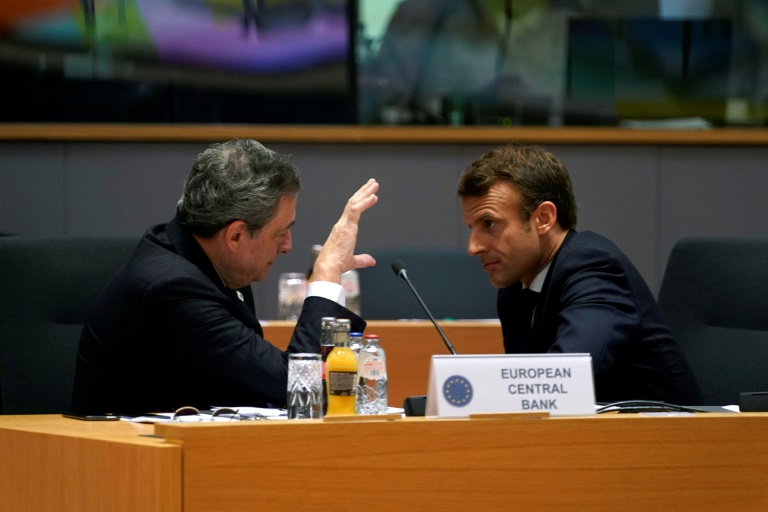
European Central Bank President Mario Draghi and France's President Emmanuel Macron (R) speaking before a meeting. (Photo: AFP)
German Defence Minister Ursula von der Leyen emerged Tuesday as a possible compromise candidate to lead the European Commission as EU leaders struggled to break the deadlock over the bloc's top jobs after three days of talks.
EU leaders have been haggling since Sunday evening over who should fill the union's four most important roles over the next five years, riven by division and infighting.
A European source told AFP that 60-year-old conservative von der Leyen's name was in the frame to replace current commission chief Jean-Claude Juncker, after an earlier proposal to name Dutch social democrat Frans Timmermans ran into stiff opposition.
Under the new proposal, von der Leyen would lead the commission, with Frenchwoman Christine Lagarde, the current head of the IMF, taking charge at the European Central Bank (ECB) -- giving the bloc's two most powerful countries a major job apiece.
The plan would also see Belgian Prime Minister Charles Michel take over from Donald Tusk as president of the European Council of member states, while the last job, of foreign policy chief, would go to either Maros Sefcovic of Slovakia or Spain's Josep Borrell.
Von der Leyen, a minister for the past 14 years under German Chancellor Angela Merkel, was proposed by French President Emmanuel Macron, according to several sources.
Hungarian government spokesman Zoltan Kovacs tweeted that the Visegrad 4 bloc -- Hungary, Poland, Czech Republic and Slovakia -- would support von der Leyen as commission chief.
Backing from the V4 would save von der Leyen the fate suffered by Timmermans, who was suggested by France and Germany as commission chief instead of the early front-runner Manfred Weber.
A marathon 18-hour negotiating session that began on Sunday evening broke up without agreement on Monday as the V4 plus Italy, where the populist government shares some of the Eastern Europeans' anger at Brussels over migration, refused to countenance Timmermans.
As he arrived at the summit on Tuesday, Czech Prime Minister Andrej Babis slammed Timmermans, who pushed a softer line on migration, as "absolutely unacceptable".
"He has always pushed a migration policy which is unacceptable for us, so this man is absolutely unacceptable and I can't see why the prime ministers of France, Spain, the Netherlands and Germany weren't able to understand," Babis said.
Other countries -- including Ireland, Latvia and Croatia -- also objected on the grounds they had not been properly consulted about the French-German plan cooked up on the sidelines of the G20 summit in Osaka at the weekend.
Spanish Prime Minister Pedro Sanchez initially stood firm behind fellow Social Democrat Timmermans on Tuesday, but after a morning of bilateral and small group meetings among leaders, the Dutchman's chances were finally buried, according to two sources close to the talks.
The flurry of last-minute informal talks kept pushing back the start of the formal session -- originally scheduled for 11:00 am, it was delayed to 1:00 pm, then 3:15 pm before finally getting under way at 4:20 pm (1420 GMT).
- 'New creativity' -
For a candidate to get the nod, they need the backing of 21 of the 28 EU leaders, representing 65 percent of the bloc's population.
Merkel said leaders would approach day three with "new creativity", but warned that "everyone needs to understand that they need to move a little -- and I mean everybody".
Deciding the top jobs has been complicated by the fragmentation of the EU political landscape in the May elections to the European Parliament.
The centre-right EPP and centre-left socialist group, the dominant forces in EU politics for years, lost their combined majority in the assembly.
The liberals, which include Macron supporters, are increasingly assertive over the choice of top jobs after they and the Greens made significant gains in the polls.


